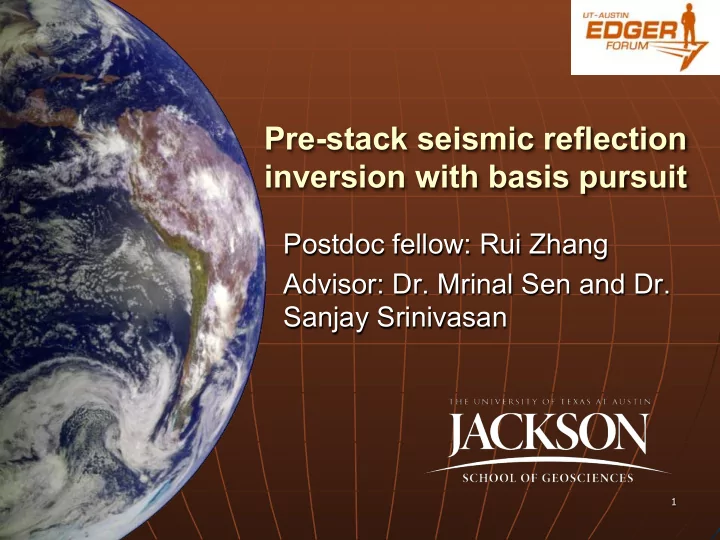

Pre-stack seismic reflection inversion with basis pursuit Postdoc fellow: Rui Zhang Advisor: Dr. Mrinal Sen and Dr. Sanjay Srinivasan 1
Outline • Motivation • Formulations • Synthetic tests • Field data • Discussions • Conclusions 2
Motivation • Post-stack to pre-stack • Acoustic to elastic • Improved resolution 3
Outline • Motivation • Formulations • Synthetic tests • Field data • Discussions • Conclusions 4
Formulations Aki & Richard !(#) = 1 / 2 ( 1+ ()*↑ 2 #) ∆ ,↓. /,↓. −4 /↑ 2 /0↑ 2 12*↑ 2 # ∆ ,↓1 /,↓1 −[ 1 / 2 ()*↑ 2 # −2 /↑ 2 / 0↑ 2 12*↑ 2 # ] ∆ 3/3 !(# , () = 1 / 2 ( 1+ ()*↑ 2 #) ∆ ,↓. ( ( ) /,↓. ( ( ) −4 /↑ 2 /0↑ 2 12*↑ 2 # ∆ ,↓1 ( ( ) /,↓1 ( ( ) −[ 1 / 2 ()*↑ 2 # −2 /↑ 2 /0↑ 2 12*↑ 2 # ] ∆ 3 ( ( ) /3 ( ( ) !↓. ( ( )= ∆ ,↓. ( ( ) /,↓. ( ( ) 5↓. = 1 / 2 ( 1+ ()*↑ 2 #) //0 is background VsVp ratio !↓1 ( ( )= ∆ ,↓1 ( ( ) /,↓1 ( ( ) 5↓1 = - 4 /↑ 2 /0↑ 2 12*↑ 2 # 5↓ ρ =−( 1 / 2 ()*↑ 2 # −2 /↑ 2 /0↑ 2 12*↑ 2 # ) !↓ ρ ( ( )= ∆ρ( ( ) / ρ( ( ) 5
Formulations 6
Formulations a + b = Even Odd Wedge reflectivity Wedge seismic response 7
Formulations 8
Formulations b A x 9
Objective Function L1 norm minimization least square solution min x − × min b A x Subject to 1 2 − × + λ min[ b A x x ] 2 1 10
Velocity 9↓( = ∆ ,↓( /,↓( =∆ 6*,↓( 6* ¡ ,↓( = 6*,↓( (0)+ ∫↑▒9↓( :( ,↓( = ,↓( ( 0 );↑∫↑▒9↓( :( Reflection Velocity coefficient 9↓( ¡: Reflection coefficient Real BPI Velocity Conventional ,↓( ¡ 11 :
Outline • Motivation • Formulations • Synthetic tests • Field data • Discussions • Conclusions 12
1D Synthetic tests 13
20% noise 14
2D Synthetic tests Noise free 20% Noise 15
2D Synthetic tests 16
Outline • Motivation • Formulations • Synthetic tests • Field data • Discussions • Conclusions 17
Seismic well “tie” 18
Angle dependent wavelets 19
Inverted Reflection Coefficients Pre-stack seismic Inverted Rp Inverted Rs 20
Inverted Reflection Coefficients Post-stack seismic Inverted Rp Inverted Rs 21
Inverted Velocity 22
Inverted Velocity Conventional Conventional BPI BPI 23
24
3D results 25
Discussions • Perfect processing • Offset-angle conversion • Accommodation of non-stationary • Angle range • Pre-stack seismic well “tie” • Initial model 26
Conclusions • Spiky reflectivities Rp and Rs is initial model independent • Blocky velocity Vp and Vs is initial model dependent • Angle dependent wavelets can stabilize the results • Two steps workflow can be QCed twice • Blocky results enhance layer cake removing side lobes 27
Acknowledgements • This work supported by Center for Frontiers of Subsurface Energy Security , an Energy Frontier Research Center funded by the U.S. Department of Energy, Office of Science, Office of Basic Energy Sciences under Award Number DE-SC0001114 • Dr. Susan D. Hovorka (BEG, GCCC) for providing data from Cranfield 28
Recommend
More recommend